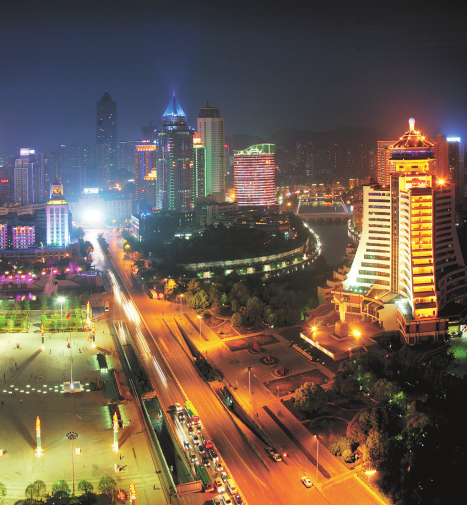
Guizhou has developed a unique character since ancient times.[CHINA DAILY]
Guizhou province aims to grow as a center of original culture even amid the modernization and industrialization of the province, said a senior official.
"Our ethnic culture is distinct, irreplaceable and eternal-it is the root and spirit of Guizhou," said Li Jun, deputy secretary of the Guizhou provincial Party committee.
"We need to preserve the old traditions and find a systematic way to promote our cultures."
Li said the provincial government now invests more than 10 million yuan ($1.63million) yearly to boost cultural activities, efforts that include studies of intangible culture, the "Colorful Guizhou" project and building related infrastructure. On the east of the Yunnan-Guizhou plateau, Guizhou covers 176,000 square kilometers including a large expanse of distinctive mountain landscape.
It is home to 49 ethnic groups including the Miao, Bouyei, Yao, Tujia, Dong, Hui, Zhuang and Man peoples.
The combined population of ethnic groups in Guizhou is more than 13 million, accounting for some 37 percent of the total in the province.
Ethnic groups play a vital role in Guizhou's cultural diversity in architecture, dance, clothes, festivals and food, said local officials.
"Originality is the core of Guizhou's folk culture," said Li, adding that the local government should dig up this "golden potential".
"While boosting integration, we also focus on improving the public's awareness about traditional cultures," Li said.
One example is the Guiyang Confucius Institute, a popular cultural destination for visitors interested in Confucianism.
"Holding culture forums at the Confucius Institute is a good way to educate the public.
"And to make more people learn the importance of 'courtesy, kindness and uprightness', we need to expand the activities to our communities, schools and offices," said Li.
The local government in Guiyang also encourages the public to learn from historical figures such as Wang Yangming, who was the most famous thinker, educator and philosopher of the Ming Dynasty (1368-1644).
His idea of "combining knowledge with acts" has become the spirit of the city. The government said it will continue efforts to deepen that influence on people's daily life through magazines, books and other media.
Based on its original folk cultures, Guizhou will hold the "Colorful Guizhou" project this year, which aims to make the province a center of cultural study, communication, competition and exhibition.
Guizhou is also a big province of intangible cultures.
"Preserving and inheriting those cultures is the key to the 'Colorful Guizhou' project," said Li, adding that Guizhou strives to play a vital part in intangible cultures in five years.
We recommend:
